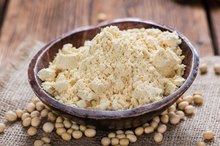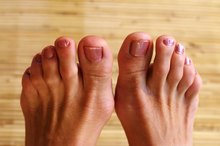Whey Protein and Gout
Gout is a type of arthritic condition caused by excess uric acid in your body. Uric acid is produced when you consume substances known as purines found in animal-based sources of protein, such as red meat and fatty fish. The good news is that whey protein is not directly linked to gout, according to Mary Fran Sowers, Ph.D., R.D., on the Arthritis Today website 1. That said, check with your doctor before taking whey protein supplements 1.
Gout
Excess uric acid in your body forms crystals around your joints, causing pain and discomfort. If you suffer from gout you should limit the amount of protein you consume from seafood and animal-based proteins. These foods contain high level of purines. According to New York University Langone Medical Center this means limiting yourself to a maximum of 4 to 6 ounces of these foods per day 2. Replacing these types of proteins with plant-based proteins, such as soy, can help control gout attacks.
- Excess uric acid in your body forms crystals around your joints, causing pain and discomfort.
- If you suffer from gout you should limit the amount of protein you consume from seafood and animal-based proteins.
Whey and Gout
Gout and Sardines
Learn More
A 12-year study published in “The New England Journal of Medicine” found that dairy products help reduce the risk of gout 3. Whey protein is a byproduct of the cheese-making process. Whey is about 20 percent of the protein found in milk. So whey protein may actually help reduce your risk of gout when consumed as directed by your doctor. A typical whey protein dosage ranges from 20 grams to 30 grams per day, but this may vary depending on your age, gender, body size and physical activity level. That’s why it’s important to see your doctor before supplementing with whey protein.
- A 12-year study published in “The New England Journal of Medicine” found that dairy products help reduce the risk of gout 3.
- So whey protein may actually help reduce your risk of gout when consumed as directed by your doctor.
Protein
Protein consumption puts an added strain on your kidneys and liver, which work to filter out waste created during protein synthesis. However, a study published in the January 2010 “New England Journal of Medicine” reports that consuming an excess amount of protein is not linked to an increased risk of gout 3. Researchers state that the level of total protein intake or the amount of dairy or vegetable protein consumed had no adverse effects related to an increased risk of gout. Mixing your whey protein with milk should not increase your gout risk.
- Protein consumption puts an added strain on your kidneys and liver, which work to filter out waste created during protein synthesis.
- However, a study published in the January 2010 “New England Journal of Medicine” reports that consuming an excess amount of protein is not linked to an increased risk of gout 3.
Considerations
Gout and Shrimp
Learn More
Although whey protein appears to be safe for people who are at risk of gout or who currently suffer from it, consuming too much whey protein can be unhealthy. Your body can only use so much protein in a day. This is the reason you should follow the recommended dietary allowance for protein, which is 0.36 grams per 1 pound of body-weight per day for sedentary adults. If you are physically active on a regular basis you may need slightly more, so consult your doctor to determine how much total protein your body needs. Weight gain can result from consuming too much protein, and this may increase your risk of gout attacks.
- Although whey protein appears to be safe for people who are at risk of gout or who currently suffer from it, consuming too much whey protein can be unhealthy.
- If you are physically active on a regular basis you may need slightly more, so consult your doctor to determine how much total protein your body needs.
Related Articles
References
- Arthritis Today: Whey Protein Supplements and Gout
- New York University Langone Medical Center: Low-Purine Diet
- The New England Journal of Medicine: Purine-Rich Foods, Dairy and Protein Intake, and the Risk of Gout in Men
- Gilbert, J.-A., Bendsen, N. T., Tremblay, A., & Astrup, A. (2011). Effect of proteins from different sources on body composition. Nutrition, Metabolism and Cardiovascular Diseases, 21, B16–B31. DOI: 10.1016/j.numecd.2010.12.008.
- Hulmi, J. J., Lockwood, C. M., & Stout, J. R. (2010). Effect of protein/essential amino acids and resistance training on skeletal muscle hypertrophy: A case for whey protein. Nutrition & Metabolism, 7(1), 51. DOI: 10.1186/1743-7075-7-51.
- Ridge, A., Devine, A., Lyons-wall, P., Conlon, J., & Lo, J. (2018). The impact of whey protein supplementation in older adults on nutrient intakes and satiety over an 11-week exercise intervention. Food Quality and Preference, 68, 72–79. DOI: 10.1016/j.foodqual.2018.01.013.
- Tahavorgar, A., Vafa, M., Shidfar, F., Gohari, M., & Heydari, I. (2014). Whey protein preloads are more beneficial than soy protein preloads in regulating appetite, calorie intake, anthropometry, and body composition of overweight and obese men. Nutrition Research, 34(10), 856–861. DOI: 10.1016/j.nutres.2014.08.015.
- Thomas, D. T., Erdman, K. A., & Burke, L. M. (2016). Position of the Academy of Nutrition and Dietetics, Dietitians of Canada, and the American College of Sports Medicine: Nutrition and Athletic Performance. Journal of the Academy of Nutrition and Dietetics, 116(3), 501–528. DOI: 10.1016/j.jand.2015.12.006.
- Zhu, K., Kerr, D. A., Meng, X., Devine, A., Solah, V., Binns, C. W., & Prince, R. L. (2015). Two-Year Whey Protein Supplementation Did Not Enhance Muscle Mass and Physical Function in Well-Nourished Healthy Older Postmenopausal Women. The Journal of Nutrition, 145(11), 2520–2526. DOI: 10.3945/jn.115.218297.
Writer Bio
Joseph Eitel has written for a variety of respected online publications since 2006 including the Developer Shed Network and Huddle.net. He has dedicated his life to researching and writing about diet, nutrition and exercise. Eitel's health blog, PromoteHealth.info, has become an authority in the healthy-living niche. He graduated with honors from Kellogg Community College in 2010 with an Associate of Applied Science.









